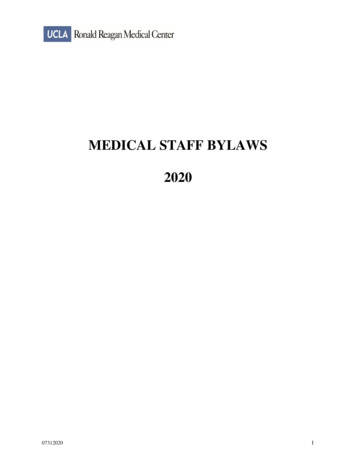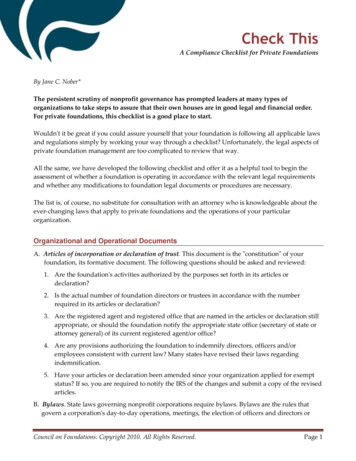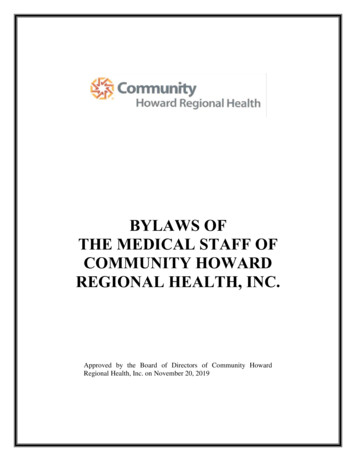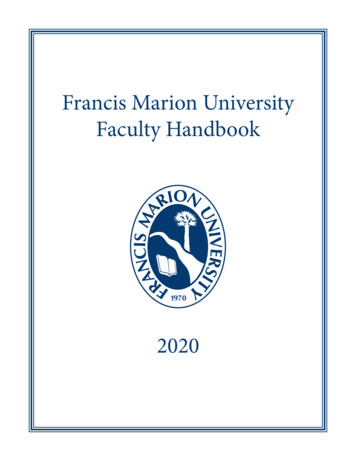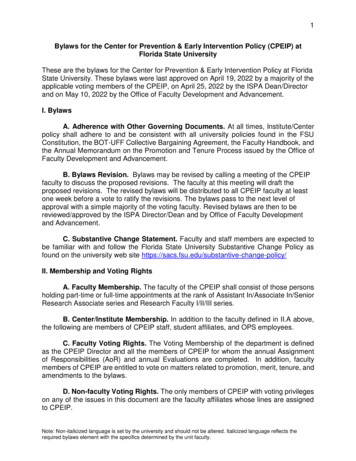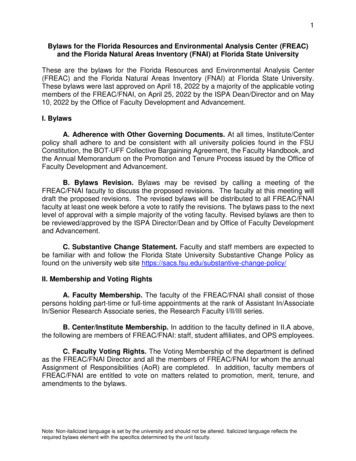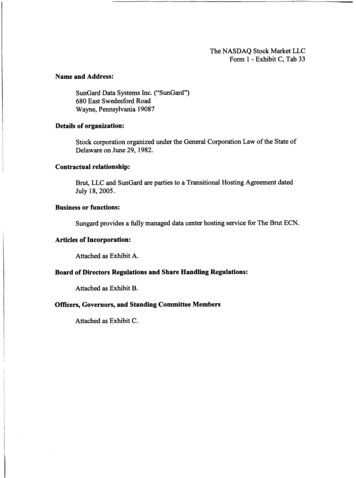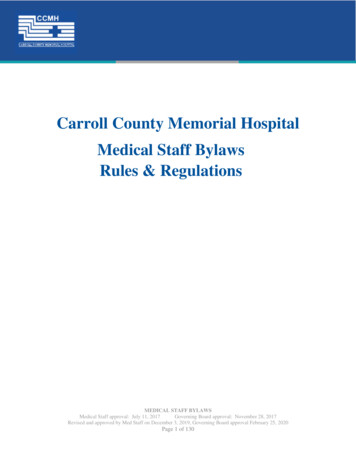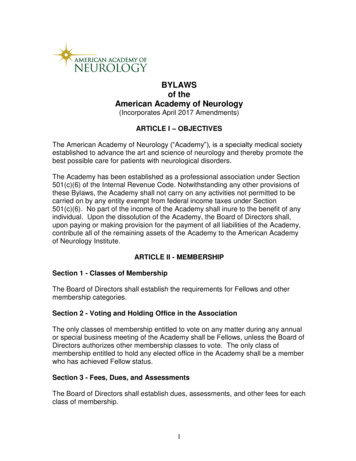
Transcription
BYLAWSof theAmerican Academy of Neurology(Incorporates April 2017 Amendments)ARTICLE I – OBJECTIVESThe American Academy of Neurology (“Academy”), is a specialty medical societyestablished to advance the art and science of neurology and thereby promote thebest possible care for patients with neurological disorders.The Academy has been established as a professional association under Section501(c)(6) of the Internal Revenue Code. Notwithstanding any other provisions ofthese Bylaws, the Academy shall not carry on any activities not permitted to becarried on by any entity exempt from federal income taxes under Section501(c)(6). No part of the income of the Academy shall inure to the benefit of anyindividual. Upon the dissolution of the Academy, the Board of Directors shall,upon paying or making provision for the payment of all liabilities of the Academy,contribute all of the remaining assets of the Academy to the American Academyof Neurology Institute.ARTICLE II - MEMBERSHIPSection 1 - Classes of MembershipThe Board of Directors shall establish the requirements for Fellows and othermembership categories.Section 2 - Voting and Holding Office in the AssociationThe only classes of membership entitled to vote on any matter during any annualor special business meeting of the Academy shall be Fellows, unless the Board ofDirectors authorizes other membership classes to vote. The only class ofmembership entitled to hold any elected office in the Academy shall be a memberwho has achieved Fellow status.Section 3 - Fees, Dues, and AssessmentsThe Board of Directors shall establish dues, assessments, and other fees for eachclass of membership.1
Section 4 - Termination of MembershipThe Board of Directors shall adopt policies concerning termination andreinstatement of membership.Section 5 - Disciplinary ActionA member of the Academy may be subject to discipline by the Academy if themember’s conduct conflicts with the professional standards and ethical principlesof the Academy. The Board of Directors shall adopt a Disciplinary Action Policy togovern all disciplinary procedures and actions.ARTICLE III - MEETINGS AND VOTE OF MEMBERSSection 1 - Annual MeetingThe Board of Directors shall conduct an annual meeting for educational courses,science programs, and a business meeting.Section 2 - Special MeetingsThe Board of Directors may also call special meetings of the Academy.Section 3 - NoticeNotice of each annual meeting shall be given to all members not less than ninetydays prior to the date on which the meeting is to begin. Notice of special meetingsshall be provided at least thirty days prior to the date on which the meeting is tobegin.Section 4 - QuorumAt any annual or special meeting, a quorum shall consist of not less than thirtyvoting members, except as required in these Bylaws.Section 5 - VoteIf a quorum is present, a majority vote of the voting members present shall berequired to constitute approval of any matter, unless otherwise provided byapplicable law, the Articles of Incorporation, or these Bylaws. There shall be novoting by proxy or mail ballot by the members at the annual meeting or specialmeetings.2
ARTICLE IV - COMPOSITION OF THE BOARD OF DIRECTORSSection 1 - DirectorsThe elected directors of the Academy shall be the President, President-Elect, VicePresident, Treasurer, Secretary, Director (of which there shall be nine), andImmediate Past-President. The ex officio voting members of the Board shall bethe Editor in Chief of Neurology , Chair of the Government Relations Committee,Chair of the Medical Economics and Management Committee, and Chair of theMember Engagement Committee. The Executive Director shall be an ex officio,non-voting member of the Board.Section 2 - ElectionElection of Officers shall be held at the annual business meeting of the Academyduring odd-numbered years, and the affirmative vote of a majority of the votingmembers present and voting shall be required for election to any office, exceptthat if there are more than two candidates for one office, a plurality vote of thevoting members present and voting shall be sufficient for election to that office.Voting shall not be cumulative.Section 3 - Term of OfficeThe Vice President, Secretary, Treasurer and Directors of the Board shall servefor a term of two years. The Directors of the Board may be nominated to servethree consecutive two-year terms in office. The Vice President, Secretary andTreasurer may be nominated to a second consecutive two-year term in the sameoffice. The Board shall stagger the terms of Directors so that the term of one-thirdof the Directors normally expires during any election year. The term of President,President-Elect and Past-President shall be for one two-year term, or until asuccessor is elected, commencing on the first day following the annual meeting atwhich they were elected. The terms of the ex officio voting members will coincidewith the term in which each member holds office.Section 4 - NominationsPrior to each annual meeting at which elections are to be held, the NominationsCommittee shall nominate Fellows of the Academy for each vacancy that occurson the Board of Directors with the exception of the President, Past-President,Editor in Chief, and ex officio voting members.Academy members shall be notified of the names of all nominees at least sixtydays prior to the annual meeting. In the event of death or withdrawal fromcandidacy of any of these nominees, the Board of Directors shall designate asubstitute nominee at any time before the election and shall announce thatdesignation before the election. In addition, nominations for positions on the3
Board of Directors may be submitted at least forty-five days before the date of theelection by a written petition, signed by one hundred or more voting members,filed with the Executive Director together with a signed statement by the nomineesetting forth willingness to serve if elected.Section 5 - PresidentThe President shall be the Chairman of the Board of Directors. The President shallpreside at all business sessions of the membership of the Academy; shall act aspokesperson of the Academy to the public, the press, legislative bodies, themedical community at large and federal, state, and local governmental and privateagencies and organizations; shall serve no more than one term as President; isresponsible for making appointments to committees; and may create ad hoc taskforces and appoint Academy representatives to professional organizations as maybe required to execute the business and affairs of the Academy.Section 6 - President-ElectThe President-Elect shall automatically become the President of the Academyupon completion of the President's term. The President-Elect shall assist thePresident in the performance of the President’s duties whenever requested to doso; and shall have all other duties and responsibilities assigned by the Presidentor the Board of Directors.Section 7 – Vice PresidentThe Vice President shall, in the absence or the disability of the President, haveand perform the duties and responsibilities of the President; shall in the event of avacancy in the office of President, however occurring, fill the vacancy in the officeof the President for the unexpired portion of the President’s term; and shall haveall other duties and responsibilities assigned by the President or the Board ofDirectors. With the advancement of the Vice President to assume the unexpiredoffice of the President, a Director shall be appointed by the Board of Directors totemporarily act in the office of the Vice President until the Vice President returnsto that office.Section 8 - TreasurerThe Treasurer shall ensure that the Academy maintains accurate financial records;review Academy expenditures and financial status on a regular basis to ensureoverall financial integrity; ensure financial accounts of the Academy are submitted toan annual independent audit; present the Academy’s financial status to the Board ofDirectors; and perform other duties assigned by the President or Board of Directors.4
Section 9 - SecretaryThe Secretary shall perform the duties assigned by the President or Board ofDirectors.Section 10 - DirectorsThe President or Board of Directors may assign additional duties to directors.Section 11 - Immediate Past-PresidentThe President or Board of Directors may assign additional duties to the ImmediatePast-President.Section 12 - VacanciesIn the event of incapacitation, withdrawal, demise, resignation or removal of anyofficer or member of the Board of Directors, except the President-Elect, thePresident, with the approval of the Board, shall appoint a successor who will holdthe appointed office until a successor has been elected. In the event ofincapacitation, withdrawal, demise, resignation or removal of the President-Elect,the Nominating Committee shall be reconvened to name a nominee for thatposition to present for election by the voting members of the Academy at the nextannual business meeting to fill the unexpired term.Section 13 - Removal from OfficeAny Board member elected by the voting members may be removed from officeby the affirmative written ballot of two-thirds of the Board members whenever, intheir judgment, the removal will serve the best interests of the Academy.ARTICLE V - RESPONSIBILITIES OF THE BOARD OF DIRECTORSSection 1 - AuthorityThe Board of Directors shall manage all the business and affairs of the Academy.The Board of Directors shall have all powers and responsibilities conferred uponthe Board of Directors of a nonprofit corporation by Chapter 317A of MinnesotaStatutes, as now or hereafter amended, except as those powers orresponsibilities may be limited by the Articles of Incorporation or these Bylaws.The Board of Directors shall have the final responsibility and authority for allactions and policies that are recommended or adopted by any and all committees,sections, representatives to professional and governmental organizations, agents,and employees; and no action or policy shall be the action or policy of theAcademy until it is adopted, ratified, or approved by the Board of Directors unlessthe Board of Directors has specifically delegated authority to a committee,5
section, representative, agent, or employee and such delegation is stated in theBoard’s minutes. The Board of Directors shall employ an Executive Director,determine the duties and salary of the Executive Director, and establish thepolicies pertaining to that office. The Executive Director’s duties include: havinggeneral active management of the business of the Academy; acting as the chiefspokesperson of the Academy; ensuring orders and resolutions of the Board ofDirectors are carried into effect; having the authority to sign and deliver in thename of the Academy deeds, mortgages, bonds, contracts, or other instrumentspertaining to the business of the Academy; and maintaining records proceedingsof the Board and the members.Section 2 - MeetingsThe Board of Directors shall meet at least twice yearly. Special meetings of theBoard of Directors may be called by the President or at the written request of fivemembers of the Board addressed to the Secretary at no less than twenty calendardays' notice.Section 3 - NoticeNotice of each meeting of the Board of Directors shall be given by the ExecutiveDirector not less than fifteen calendar days prior to the date on which the meetingis scheduled to be held. The matters to be discussed and voted upon at any dulycalled meeting of the Board of Directors shall not be limited to those set forth inthe notice of the meeting.Section 4 - QuorumA majority of the voting members of the Board of Directors shall constitute aquorum for the transaction of business.Section 5 - Manner of ActingA majority vote of the Board of Directors members present and voting at ameeting at which a quorum is present shall be the act of the Board of Directors,unless the vote of a larger number is required by applicable law, the Articles ofIncorporation, or these Bylaws.Section 6 - Written ActionAny action that the Board of Directors could take at a duly called meeting of theBoard, may be taken by a written action signed by two-thirds of the Directors,except that as to those matters requiring member approval, the written actionmust be signed by all of the Directors. Each Director may sign a separatecounterpart of the written action, but all Directors will be notified in writing of theproposed action before voting takes place. An email from a director is considered6
signed approval. Written actions of the Board of Directors shall be included in theminutes of the previous Board meeting.Section 7 - Remote CommunicationsA conference among Directors by any means of communication, in-person orremote, through which such persons may simultaneously hear each other duringthe conference is a meeting of the Board of Directors if the same notice is given ofthe conference as would be required for a meeting, and if the number of personsparticipating in the conference would be sufficient to constitute a quorum at ameeting. Participation in a meeting by that means constitutes presence in personat the meeting. "Remote communication" means communication via electroniccommunication, conference telephone, video conference, the Internet, or suchother means by which persons not physically present in the same location maycommunicate with each other on a substantially simultaneous basis.Section 8 - Executive Committee of the Board of DirectorsBetween meetings of the Board of Directors, the Board’s power is delegated to anExecutive Committee which shall include the President, President-Elect,Treasurer and at least two other members from the Board of Directors appointedby the President, and the Executive Director, ex officio. Meetings may beconducted by conference call or other remote communications. The actions ofthe Executive Committee shall be reported to the next meeting of the Board ofDirectors.Section 9 – PoliciesThe Board of Directors may adopt policies, which may be amended or revisedfrom time to time, but may not be inconsistent with the Articles of Incorporation orBylaws.ARTICLE VI - MISCELLANEOUSSection 1 - Fiscal YearThe fiscal year of the Academy shall be from January 1 to December 31.Section 2 - Journal - NEUROLOGYA. The Journal NEUROLOGY shall be the official journal of the Academy.B. The Board of Directors shall appoint the Editor in Chief, who shall haveresponsibility for all the contents of the journal NEUROLOGY and oversee theactivities of the Editorial Board. The Editor in Chief will serve one six-yearterm, which is renewable for another four-year term. There shall be a Journal7
Arbitration Committee to resolve disputes between the Board of Directors andthe Editor in Chief.1. Committee members shall be selected when an Editor in Chief is appointedor reappointed. The Committee will include five (5) neurologists who arenot members of the Board of Directors, members of the Editorial Board, orchairs of a standing committee. The Nominating Committee shall submit alist of ten (10) names to the Executive Committee and the Editor in Chief,who shall jointly select five (5) committee members and shall designate thechair of the Committee. If the Executive Committee and the Editor in Chiefcannot agree on five (5) members from the initial list, the NominatingCommittee shall submit additional names until the Executive Committeeand the Editor in Chief agree on five (5) committee members. If a vacancyexists, the same process will be used for the appointment of a neurologistto complete the term. The names of the chair and the other members ofthe Committee will be published in NEUROLOGY.2. In the event of a dispute, either the Board of Directors or the Editor in Chiefmay convene the Committee. The Committee will consider the views ofboth parties and may solicit outside advice or information. The majoritydecision of the Committee will be binding on both the Board of Directorsand the Editor in Chief. The Committee will convene only for the purposeof promptly resolving disputes and will have no other duties unlessspecifically authorized by the Board of Directors. If the Committee isconvened and is considering a dispute, the membership of that Committeewill not change, for the purposes of that dispute only, until that dispute issettled, even if the deliberation extends into the next term.Section 3 - Notice and Waiver of NoticeNotice is deemed given by a member of the Academy or to an officer of theAcademy when it is in writing and mailed, e-mailed or delivered to the Academy orthe officer at the principal executive office of the Academy. In all other cases,notice is deemed given to a person when it is communicated to the person orallyin person or by telephone or is in writing and telegraphed, mailed, or delivered tothe person at the person's last known address. Notice by mail is given when it isdeposited in the United States mail with sufficient postage affixed. Whenever anynotice is required to be given by law, the Articles of Incorporation, or theseBylaws, a waiver of the notice may be executed in writing by the person orpersons entitled to the notice, whether before, during, or after the time statedtherein, and the waiver shall constitute the equivalent of receiving the notice.Section 4 - IndemnificationA. To the full extent permitted by any applicable law, subject to the limitations setforth in this Article VI, Section 4, this corporation shall indemnify each person8
made or threatened to be made a party to any threatened, pending orcompleted civil, criminal, administrative, arbitration, or investigative proceeding,other than a proceeding by or in the right of this corporation, against theexpenditures set forth below, by reason of the former or present officialcapacity of the person. For the purposes of this Section, “official capacity”means:1. Any person who is or was a director, officer, presidential appointee or othermember authorized to act on behalf of or represent the Academy, amember of a committee of the board, an employee or agent of theAcademy; or2. A director, officer, presidential appointee or other member authorized to acton behalf of or represent the Academy, a member of a committee of theboard, or an employee or agent of the Academy, who while serving in thiscapacity, is or was serving another organization or employee benefit plan atthe request of the Academy.B. Indemnification of those acting in an official capacity is mandatory, if, withrespect to the acts or omissions of the person complained of in theproceeding, the person:1. Has not been indemnified by another organization or employee benefit planfor the same liability described in the preceding paragraph with respect tothe same acts or omissions;2. Acted in good faith;3. Received no improper personal benefit and Minnesota Statutes Section317A.255, as now enacted or hereinafter amended, regarding conflicts ofinterest has been satisfied;4. In the case of a criminal proceeding, did not have reasonable cause tobelieve the conduct was unlawful; and5. In the case of acts or omissions occurring in the official capacity of anindividual described in Section 4.1(a), reasonably believed that the conductwas in the best interests of this corporation, or in the case of acts oromissions occurring in the official capacity of an individual described inSection 4.1(b), reasonably believed that the conduct was not opposed tothe best interests of this corporation.C. A person acting in an official capacity who is eligible for mandatoryindemnification shall be entitled to reimbursement by the Academy ofreasonable expenses in advance of the final disposition of a proceeding inaccordance with, and to the full extent permitted by, any applicable law.9
D. The rights of indemnification provided in this section shall not limit, but shall bein addition to, any other rights to which such person acting in an officialcapacity may otherwise be entitled by contract, law or statute, or otherwise;and in the event of such person's death, such rights shall extend to suchperson's heirs, legal representatives, or successors.E. Determination of eligibility for indemnification payments or advances shall bemade in accord with Minnesota Statutes Section 317A.521, as now enacted orhereinafter amended.F. The Academy, its directors and officers, shall be fully protected in making anydetermination under this section, or in making or refusing to make anypayment under this section, in reliance upon the advice of counsel. TheAcademy may, to the full extent permitted by applicable law, purchase andmaintain insurance on behalf of any person who is or was a director, an officeror employee of this corporation or a member of a committee of this corporationagainst any liability asserted against such person in any such capacity.G. If any provision of this section shall for any reason be determined to be invalid,the remaining provisions hereof shall not be affected thereby but shall remainin full force and effect.Section 5 - Governing LawThese Bylaws and the policies of the Academy, and any disputes involving theAcademy’s Bylaws and policies, shall be construed according to, and governedby, the law of the State of Minnesota.Section 6 – Parliamentary ProcedureThe membership during the annual business meeting, Board of Directors, andcommittees shall be governed by the current version of Roberts Rules of Orderunless superseded by the Articles of Incorporation, Bylaws, or policies adopted bythe Board of Directors.ARTICLE VII - AMENDMENTSThese Bylaws may be amended, altered or repealed at any meeting, annual orspecial, by the vote of at least two-thirds of the voting members present andvoting, provided that any proposed amendment 1) has been submitted in writingto the Board of Directors by at least fifty members with voting rights or ten percentof the members with voting rights, whichever is less, or has been approved by theBoard of Directors, and 2) notice thereof has been provided to the votingmembers by mail, e-mail, or fax at least one month prior to the meeting at which itwill be acted upon.10
History:Adopted by Incorporator on May 29, 2007AANPA Board of Directors on June 9, 2007Members on April 15, 2008Members on April 28, 2009Members on April 13, 2010Board of Directors on December 2, 2010 (Policy 2010-23)Members on April 23, 2012Members on April 28, 2014Members on April 20, 2015Members on April 22, 201711
The Board of Directors shall conduct an annual meeting for educational courses, science programs, and a business meeting. Section 2 - Special Meetings The Board of Directors may also call special meetings of the Academy. Section 3 - Notice Notice of each annual meeting shall be given to all members not less than ninety



